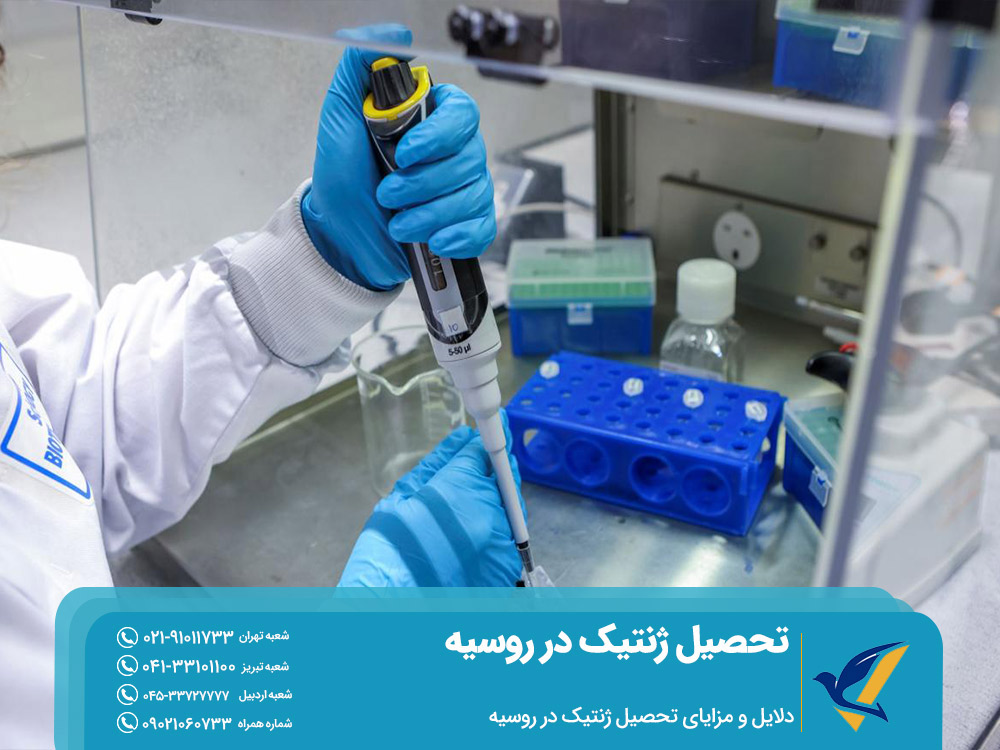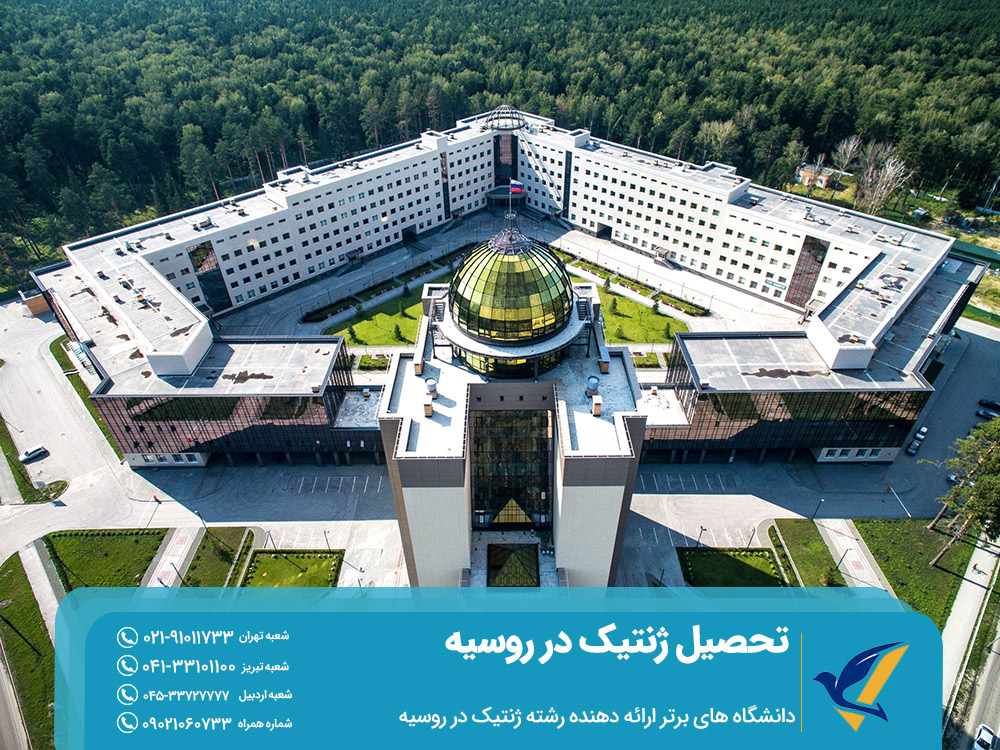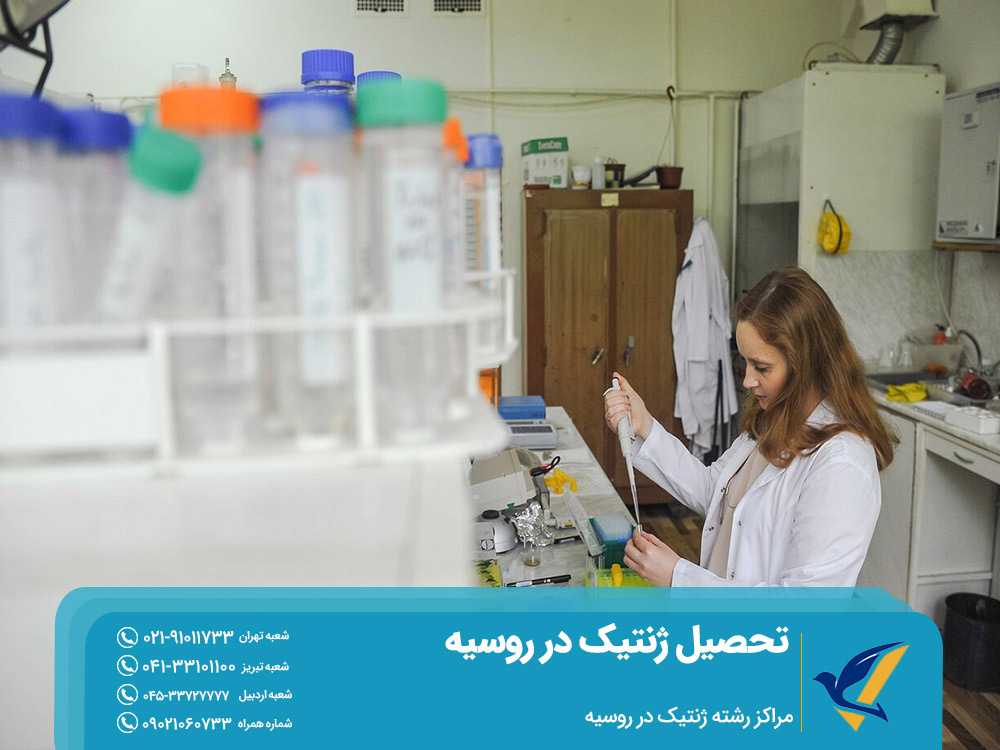Studying Genetics in Russia
In recent years, many students have shown interest in pursuing genetics in Russia. As a specialized branch of life sciences, genetics focuses on understanding the hereditary basis of human diseases. Russia has become a popular destination for international students due to several advantages, including the affordability of genetics programs, the availability of government scholarships that allow students to study for free, and the opportunity to learn the Russian language. Moreover, Russia provides an ideal environment for both education and student life.
Renowned universities such as Lomonosov Moscow State University offer genetics programs for those eager to study this field. If you’re considering studying in Russia, stay with us until the end of this article by Elm Vira for comprehensive insights.
Why Study Genetics in Russia?
Pursuing a degree in genetics in Russia is highly recommended for individuals passionate about research, problem-solving, and tackling new challenges. Academic migration to Russia is one of the most effective pathways for relocating to the country. Graduates often have better prospects for securing permanent residency or finding employment. Additionally, students in Russia have the opportunity to work while studying, making it a financially viable option.
Beyond affordability, many Russian universities are recognized by Iran’s Ministry of Health, ensuring that graduates can pursue careers in their home country. Furthermore, students can apply to Russian universities and study in Russian, broadening their opportunities. In the following sections, we will explore the requirements for studying genetics at different academic levels.
Admission Requirements for Genetics Programs in Russia
1. Bachelor’s Degree in Genetics
The undergraduate program in genetics in Russia typically spans four years. Many of the country’s top universities offer genetics programs in both Russian and, in some cases, English.
Before enrolling in a bachelor’s degree, students are generally required to complete a preparatory course (Padfak) to build their academic foundation. After that, they must pass relatively simple university entrance exams. Admission requirements may vary slightly between universities, but the essential documents needed for a bachelor’s degree in genetics include:
- A high school diploma (12 years of schooling) along with transcripts and academic records
- Letter of recommendation
- Statement of purpose (SOP)
- Language proficiency certificate
- Two medical certificates
2. Master’s Degree in Genetics
A master’s degree in genetics in Russia typically takes two years to complete and is offered in both Russian and English. Given the affordability of tuition fees, students at the master’s level have access to more scholarship opportunities compared to undergraduate students.
To secure admission to a master’s program in genetics, applicants generally need to provide the following documents:
- Minimum passing scores in previous graduation exams (requirements vary by university and department)
- Research projects and work experience (mandatory at some universities)
- Personal interview
- Academic CV (Resume)
- Letter of recommendation
- Statement of purpose (SOP)
- Language proficiency certificate
- Two medical certificates
3. Ph.D. in Genetics
A Ph.D. in genetics in Russia provides students with the opportunity to lead a 3–4-year research project aimed at deepening their understanding of genetics. Doctoral programs focus on advanced studies in human and molecular genetics, biotechnology, biology, and other specialized fields based on the student’s research interests.
To apply for a Ph.D. in genetics in Russia, candidates must submit the following:
- Previous academic degrees (Bachelor’s and Master’s)
- Acceptance from a faculty supervisor
- Published research papers in the relevant field (if available)
- Academic CV (Resume)
- Statement of purpose (SOP) or personal statement
- Letter of recommendation from university professors
- Research proposal
- Two medical certificates
Each academic level offers unique opportunities and challenges, making Russia an excellent destination for students interested in genetics.

Reasons and Benefits of Studying Genetics in Russia
Russia is known for having one of the best mass education systems in the world, with a long-standing tradition of providing high-quality education to all citizens. One of the biggest advantages of studying in Russia is the affordable tuition fees. The cost of studying genetics in Russia is relatively low, typically ranging between $2,000 to $8,000 per year.
Additionally, Russia is home to over 160 ethnic groups, that speak more than 100 different languages. This cultural diversity creates a vibrant environment for international students. Despite its large population, Russia is considered a safe country for both living and studying. Other benefits of studying genetics in Russia include:
- The opportunity to learn the Russian language
- Breathtaking natural landscapes and beautiful cities
- A diverse and multicultural atmosphere
- Part-time work opportunities while studying
Required Documents for a Work Visa in Russia
For genetics specialists seeking employment in Russia, passing the Federal Ministry of Health exam is mandatory. Additionally, proficiency in the Russian language is crucial, although some companies offer employment opportunities in English. The required documents for obtaining a work visa in Russia include:
- Essential identification documents (birth certificate, passport, and invitation letter)
- Visa processing fee, which varies based on the applicant’s home country
- Submission of an application and supporting documents to the Russian consulate abroad
- Work visa invitation letter issued by Russia’s Ministry of Internal Affairs
- Employer’s letter of confirmation
- HIV test result, taken within three months before application, valid for 15 to 30 days
- Health insurance required only for citizens of EU countries, Iran, Iceland, Palestine, Liechtenstein, Monaco, Norway, and Switzerland.
These factors make Russia an attractive destination for those pursuing both higher education and career opportunities in genetics.

Top Universities Offering Genetics in Russia
According to the
U.S. News & World Report rankings, the best universities in Russia for studying
molecular biology and genetics include:
- Lomonosov Moscow State University
- Novosibirsk State University
- Saint Petersburg State University
In addition to these top institutions, several other universities in Russia also offer
genetics programs, such as:
- RUDN University
- Kazan Federal University (Volga Region)
- First Moscow State Medical University
Tuition Fees for Genetics in Russia
Although studying genetics in Russia is considered affordable,
tuition fees vary by university and city. Below is a table outlining the average annual tuition fees for genetics programs at some of the best universities:
| University |
Average Tuition Fee (per year) |
| Lomonosov Moscow State University |
$4,920 |
| Saint Petersburg State University |
$4,920 |
| National Research Nuclear University MEPhI |
$5,000 |
| Far Eastern Federal University |
$5,000 |
| Lobachevsky State University |
$5,000 |
Required Exams for Studying Genetics in Russia
Since
2019, the
Russian Federal Ministry of Health has made it
mandatory for applicants seeking
work permits in genetics-related fields to pass an official exam. This exam, conducted by
Roszdravnadzor, is specifically designed for
medical professionals, including genetic specialists. Those who pass the exam can proceed with the next steps to obtain their work permit in Russia.

Genetics Research Centers in Russia
Russia is home to several leading international research centers for genetics. Among them, the State Research Center of the Russian Federation and the State Research Institute of Genetics and Industrial Microorganisms (GosNIIgenetics) are at the forefront of biotechnology research. These institutions are internationally recognized for their fundamental contributions to the genetics and genetic engineering of industrial microorganisms.
The GosNIIgenetics Institute focuses on:
- Developing new biotechnological processes for the production of biologically active substances.
- Using microorganisms for the production of amino acids, enzymes, nucleotides, vitamins, antibiotics, recombinant proteins, and bio-catalysts for the chemical industry.
- Advancing environmental biotechnology for sustainable industrial applications.
For over 40 years, GosNIIgenetics has led fundamental research in molecular genetics and bioinformatics, establishing a renowned academic faculty specializing in bacterial and bacteriophage genetics.
Career Opportunities in Genetics in Russia
To pursue genetics studies in Russia, students should have a strong background in chemistry, biology, and physics. Courses cover key topics such as:
- Cell Biology
- Genomics
- Bioinformatics
- Plant Genetics and Heredity
- Molecular Evolution and Genetic Modeling
During their studies, students can gain practical experience through research internships in laboratories and scientific teams. Part-time jobs in research labs and institutions provide hands-on training.
Upon graduation, students have various career opportunities in Russia, including:
- Clinical Researchers & Scientists
- Epidemiologists
- Medical Sales Representatives
- Laboratory Technicians
- Scientific Writers
With affordable tuition fees and high demand for genetics professionals, Russia presents excellent opportunities for students interested in the field.

Studying Genetics in Russia: Earnings of Genetics Specialists
The
salary of genetics professionals in Russia largely depends on their
experience. Individuals with
2 to 5 years of experience earn
23% more than those with
less than 2 years of experience. Similarly, professionals with
15 to 20 years of experience earn
229,000 rubles per month (~$3,755), which is
10% more than those with
10 to 15 years of experience.
Interestingly,
gender influences salaries in Russia. Male genetics specialists earn approximately
8% more than their female counterparts. Below is an overview of genetics salaries in Russia based on experience:
| Experience |
Salary (Rubles per Month) |
| 0 – 2 years |
103,000 RUB |
| 2 – 5 years |
126,000 RUB |
| 5 – 10 years |
178,000 RUB |
| 10 – 15 years |
208,000 RUB |
| 15 – 20 years |
229,000 RUB |
| 20+ years |
243,000 RUB |
Conclusion
This article, provided by
Elm Vira, has explored the
key aspects of studying genetics in Russia, including
tuition fees, admission requirements, career prospects, and salary expectations. We hope this information has been helpful in guiding your decision.
If you are considering studying in Russia, feel free to
contact our experts at
Elm Vira Immigration Institute for
free consultation and detailed guidance.
میانگین امتیازات 5 از 5
Vote count: 1 Vote